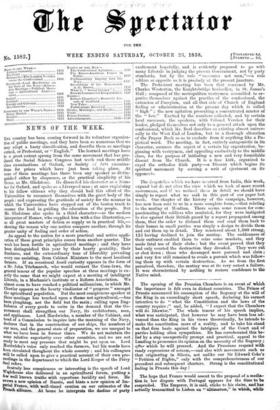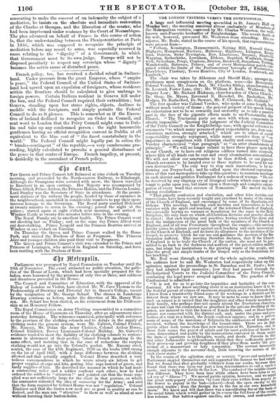NEWS OF THE WEEK.
Tun country has been coming forward in its volunteer organiza- tion of public meetings, and they have been so numerous that we may adopt a hasty classification, and describe them as meetings earned, or Protestant, or " English." The learned meetings have to a great extent sprung from the same movement that has pro- duced the Social Science Congress last week and those middle class examinations of Oxford, or Society of Arts examina- tions for prizes which have just been taking place. At none of these meetings has there been any speaker so distin- guished either by eloquence, or the practical simplicity of his theme, as Mr. Gladstone. He discarded his character as a Mem- ber for Oxford, and spoke as a Liverpool man ; at once explaining to his fellow citizens why they should hail this effort of the Universities to reconnect themselves with the great body of the people; and expressing the gratitude of society for the manner in which the Universities have stepped out of the beaten track to resume the lead in guiding the education of the people. But Mr. Gladstone also spoke in a third character—as the modern interpreter of Homer, who supplied him with a fine illustration,— as all great masters of fiction so supply us in practical life,— showing the reason why one nation conquers another, through its greater unity of feeling and order of action.
An appeal to the nation for a more practical and active appli- cation of these great principles comes from another quarter. The week has been fertile in agricultural meetings ; and they have been distinguished this year by their hearty geniality, their frankness, and the extraordinary tone of liberality pervading every one assisting, from Cabinet Ministers to the most localized farmers. If an occasional fossil curiosity appears in the form of a Mr. John Titehmarch, who would reenact the Corn-laws, the general tenour of the popular speeches at these meetings is ex- actly the same that we might expect at a meeting of intelligent Liberals, in a Mechanic's institute or a Reform Association. We almost seem to have reached a political millennium, in which Mr. Chowler appears as the hearty vindicator of " progress " amongst the agricultural population. But the most conspicuous speaker at these meetings has touched upon a theme not agricultural,—has been ploughing, not the field but the main ; calling upon Eng- lishmen of every grade to unite in the demand that the Go- vernment shall strengthen our Navy, its architecture, men, and appliances. Lord Hardwicke, a member of the Cabinet, and head of a Commission to inquire into the manning of the Navy, declares that in the construction of our ships, the numbers of our men, and the general state of preparation, we are unequal to what we have been in former times. We do not maintain the same relative superiority over other countries, and we are not ready to meet any pressure that might be put upon us. Lord Hardwicke's voice only reached the farmers, but his words have been circulated thoughout the whole country ; and his colleagues Will be called upon to give a practical account of their own pro- eeedings in the department to which the Lord Keeper of the Privy Seal refers.
Scarcely less conspicuous or interesting is the speech of Lord WUrlehouse also delivered in an agricultural forum, putting a few well known truths with opportune lucidity and force. He avows a new opinion of Russia, and hints a new opinion of Im- perial Frahm, with well-timed caution on our estimates of the French alliance. At home he interpret* the &chile of party
excitement hopefully, and is evidently prepared to go with many Liberals in judging the present Government, not by party standards, but by the rule " measures not men,"—a rule seldom so apposite as it is precisely at the present juncture.
The Protestant meeting has been that convened by Mr. Charles Westerton, the Knightsbridge bookseller, in St. James's Hall ; composed of the metropolitan vestryraen assembled to or- ganize themselves against the practice of the confessional, the extension of Puseyism, and all that side of Church of England feeling or administration at the present day which is called " high " ; the new agitation presenting a concentrated muster of the " low." Excited by the numbers collected, and by certain local successes, the speakers, with Colonel Vereker for their leader, pledged themselves not only to a general attack upon the confessional, which Mr. Beal describes as existing almost univer- sally in the West End of London, but to a thorough alteration of the Prayer Book so as to exclude from it anything like a Pa- pistical word. The meeting, in fact, entirely antagonistic in its character, assumes the aspect of a certain lay organization, be- ginning with vestrymen, and appealing exclusively to the middle class, for the purpose of initiating a new and very formidable dissent from the Church. It is a free kirk, organized to expel the orthodox Kirk party—a Dissent which begins its spiritual movement by serving a writ of ejectment on its opponents.
The despatches hich we have received from India, this week, expand but do not alter the view u hich we took of more recent movements, and if we noticed them in detail we should have simply to repeat what we said in this part of our paper last week. One chapter of the history of the campaign, however, has now been sent to us in a more complete form,—that relating to the mutiny at Mennen. There seems some reason for com- passionating the soldiers who mutinied, for they were instigated to rise against their British guard by a report propagated among them, that the order to disband them and send them back to their homes in small parties was simply a design to divide them and cut them up in detail. They mustered about 1,300 strong, 125 having declined to join the mutiny. The suddenness of their outburst enabled them to seize some muskets, and they made fatal use of their clubs ; but the event proved that they had only courted the destruction they dreaded. They were cut or shot down ; those who decamped were pursued and slain ; and very few still remained to evade a pursuit which was follow- ing them up with certain destruction. As we from the first perceived, therefore, the mutiny was at its very outset a failure. It was characterized by nothing to restore confidence to the Native mind.
The opening of the Prussian Chambers is an event of which the importance is felt even in distant countries. The Prince of Prussia announced his assumption of the Regency at the will of the King in an exceedingly short speech, declaring his earnest intention to do " what the Constitution and the laws of the country require ;" and, he added, " I expect that the Chambers will do likewise." The whole tenour of his speech implies, what was anticipated, that however he may have been less ad- vanced than the King in his views theoretically, he intends to make the constitution more of a reality, and to take his stand on that firm basis against the intrigues of the Court and of parties holding alien sympathies. He has corroborated this be- lief by a step unexpectedly prompt and practical, appeal to the Laudtag to pronounce its opinion on the necessity of the Regency ; after which he will proceed. And the Prussians respond with ready expressions of esteem,—and also with movements such as that originating in Silesia, not unlike our Sir Edward Coke's " Petition of Rights," only with the comprehensiveness of our precedent and subsequent charters. Strong is the constitutional feeling in Prussia this day !
The hope that France would assent to the proposal of a media- tion in her dispute with Portugal appears for the time to be suspended. The Emperor, it is said, sticks to his claim, and hap actually transmitted to Lisbon an " ultimatum," in which, while consenting to make the amount of an indemnity the subject of a mediation, he insists on, the absolute and immediate restoration of the Charles et Georges, and the liberation of the master, who had been imprisoned under sentence by the Court of Mozambique. The plea advanced on behalf of France in this course of action is, that the understanding between the Plenipotentiaries at Paris in 1856, which was supposed to recognize the principle of mediation before any resort to arms, was especially reserved in cases relating to the " dignity " of a Government, in which that Government must be its own judge. Europe will not be disposed peculiarly to respect any sovereign whose " dignity " becomes the active cause of disturbed peace.
French policy, too, has received a decided rebuff in Switzer- land. Under pressure from the great Emperor, whose " empire is peace," the Federal Council of the United States of Switzer- land had agreed upon an expulsion of foreigners, whose residence within the frontiers should be calculated to give umbrage to foreign powers. Certain Italians resident in Geneva fell under the ban, and the Federal Council required their extradition ; but Geneva, standing upon her states rights, objects, declines to meddle with the foreigners, and simply permits the Federal Council to do as it pleases. This is somewhat as if the Execu- tive of Ireland declined to recognize an Order in Council, and sent word to London that the Privy Council might come to Dub- lin and take up any condemned person ; the right honourable gentlemen having no official recognition current in Dublin at all equivalent to the blue coat of " the finest constabulary in the world." The Federal Council might legally put in action the " bundes-contingent " of the republic,—a very cumbersome pro- ceeding, highly calculated to provoke a general disturbance of the peace in that centre of Europe. French impolicy, at present, is decidedly in the ascendant of French policy.



























 Previous page
Previous page